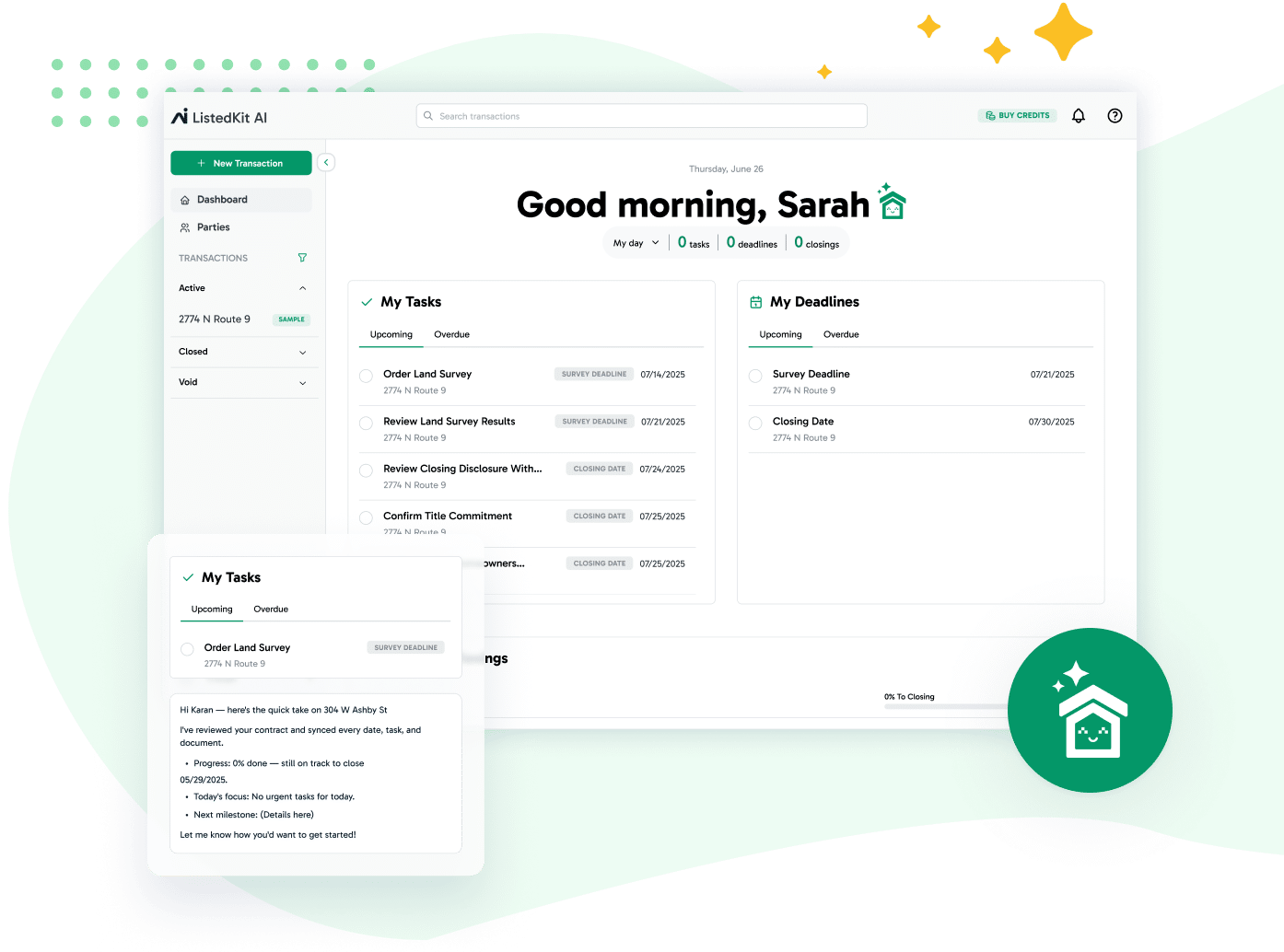Transaction coordinators face a relentless workload: managing data, tracking deadlines, and resolving errors. As these repetitive tasks pile up, they can feel overwhelming and pull focus away from the most critical aspects of real estate transactions.
The AI revolution is transforming this dynamic by simplifying workflows and minimizing errors. These advanced tools save time, improve accuracy, and empower coordinators to handle complex responsibilities more confidently and efficiently.
Today, we’ll explore the role of AI in transaction management, uncovering how it saves time, reduces mistakes, and supports the human touch in real estate processes.
How AI is Transforming Real Estate Processes
Real estate transactions are all about precision, timing, and smooth coordination. But as a transaction coordinator, you probably face problems that always seem to burgeon the timeline and include unnecessary inefficiencies in your workflow.
- Manual Data Entry. Moving data from one system to another, or even into spreadsheets, can be time-consuming and prone to mistakes. Entering one wrong number or name will delay your transactions. For example, if incorrect property details are added to a listing, miscommunication between buyer and seller means you must spend even more time correcting this.
- Fragmented Systems. You have to juggle many different tools to manage everything from contract tracking to scheduling property viewings and communicating with clients. Such a lack of connectivity reduces visibility, making it difficult to clearly see the status of a transaction and slowing you down from quick, informed decisions.
- Missed Deadlines. Managing such vital milestones as an inspection date or contingencies usually becomes chaotic without the appropriate tools. You do know that in case of some deadline failure, the deal would be in the blaze-you leave your client disappointed or at least unsatisfied with the process flow of the deal itself.
- Lack of Transparency. In the absence of any central system that would track the transactional movement, keeping agents and clients, as well as all the other participants, informed about each and every stage of the process becomes really troublesome. In places where communications are slow or unclear, that impacts trust and client satisfaction, adding further tension to the task of bridging the gaps.
How AI Helps You
Artificial intelligence simplifies your work by automating repetitive tasks, minimizing errors, and creating consistency in your processes.
With AI-powered tools, you can automate and instantly visualize the progress of every transaction. This helps immensely in keeping everyone on board with minimal chances of error.
In addition, it allows you to focus on what you excel at—carrying out transactions successfully and providing the best outcomes for your consumers and stakeholders in general.
What the AI Revolution Means for Real Estate
AI permanently changed the face and pace of real estate. As someone working with transaction coordinators, I noticed how much of what was done using manual, human-driven workflows transitioned to time—and effort-saving automation. But how exactly is this transformation unfolding, and what does it mean for you and your work?
1. Automating Routine Tasks
AI-powered algorithms are taking over time-consuming administrative tasks, giving you more room to focus on high-value responsibilities like managing client relationships and transaction strategies.
- Scheduling Property Viewings. AI systems handle complex scheduling, ensuring appointments are booked efficiently with multiple stakeholders involved. This frees up your time to manage more critical transaction milestones.
- Transaction Reminders. Automated tools send alerts for important deadlines, such as contingencies or financing approvals, so you can stay on top of tasks without manually tracking every date.
- Accurate Property Valuations. Advanced algorithms analyze market trends and property attributes to deliver precise valuations. This streamlines the process, giving you and your clients reliable data without hours of manual research.
2. Smarter Decision-Making with Predictive Analytics
AI enhances decision-making by analyzing market trends and providing actionable insights. For transaction coordinators, this means better tools to guide their decisions and help their clients achieve their goals.
- Identifying Growth Areas. AI tools analyze property markets to pinpoint locations with high potential for value appreciation, helping you guide clients toward better investments.
- Data-Driven Investment Decisions. With AI and machine learning, you gain detailed insights on property values and rental income potential, equipping you to assist clients in making informed decisions.
- Future Market Trends. Predictive analytics help you stay ahead by forecasting changes in property markets. This knowledge gives you the tools to prepare for shifts and provide value to your potential clients in market conditions.
3. Enhancing Transactions with Smart Contracts
Smart contracts powered by AI are changing how real estate deals are executed. These self-executing agreements handle predefined conditions, helping you reduce contract processing time.
- Efficient Diligence Process. Smart contracts handle tasks like verifying property titles or payment schedules, reducing your administrative workload.
- Error Minimization. By automating these steps, AI reduces the chance of human errors that might otherwise delay or derail transactions.
- Faster Closings. Automating key steps means transactions move forward more quickly and helps you provide a smoother, more efficient process for clients.
4. Personalizing the Real Estate Experience
AI tools also transform how you deliver a personalized experience for clients by providing tailored solutions that match their needs.
- Personalized Property Recommendations. AI analyzes data on client preferences and property attributes, helping you match buyers with properties that meet their exact criteria.
- Custom Property Searches. Advanced AI engines allow you to refine searches based on criteria like budget, location, or features, saving you time and making searches more efficient.
- AI-Powered Contract Review. Reviewing and extracting key details from contracts can take hours. AI tools, like those offered by ListedKit, speed up the process by analyzing documents and pulling essential data in minutes.
- Automated Task Updates. AI tools also help keep your transactions on track by setting reminders for critical milestones like financing contingency or HOA addendum deadlines. This ensures nothing is overlooked, giving you peace of mind while improving client satisfaction.
Transforming Task Management with AI
Transaction coordination often involves managing multiple moving parts simultaneously, from scheduling property inspections to ensuring timely document submission. AI-powered tools like ListedKit offer a smarter approach to handling these processes.
- Automated Task Reminders. AI tools help coordinators keep track of critical deadlines. For example, ListedKit sends automated alerts for contingencies, closing dates, and financing approvals, so no task slips through the cracks.
- Centralized Dashboards. ListedKit consolidates all aspects of transaction management into one interface, enabling coordinators to view updates, pending tasks, and completed milestones in real time. This reduces the need for manual tracking and improves efficiency.
- Real-Time Updates for Stakeholders. Keeping real estate agents, property managers, and clients informed is essential. ListedKit’s AI-powered system provides timely updates on transaction progress, enhancing transparency and communication.
Practical Example: A property manager overseeing multiple real estate transactions can use ListedKit to track deadlines, schedule property viewings, and monitor maintenance requests in one place. This eliminates the need for multiple tools and creates a more streamlined process.
AI in Contract Analysis
Contracts are a critical component of real estate transactions, but manual reviews often consume valuable time and increase the risk of errors. AI-powered tools revolutionize this process by bringing efficiency and accuracy to contract analysis.
- Clause Detection and Compliance. AI algorithms quickly scan contracts for essential clauses, such as financing contingencies, inspection deadlines, or property title details. These tools ensure compliance with real estate processes by flagging missing or inconsistent information.
- Error Reduction. Traditional contract reviews may overlook minor details that later cause disputes. AI identifies discrepancies, reducing the likelihood of costly mistakes and protecting real estate businesses from legal complications.
- Faster Turnaround Times. Reviewing multiple contracts can take hours, but AI-powered tools complete the same task in minutes. This allows coordinators to handle a higher volume of transactions without compromising quality.
Real-World Application: A real estate firm managing dozens of transactions each month can use AI-powered contract analysis to expedite reviews. By automating this process, coordinators have more time to focus on client interactions and improving customer satisfaction.
The Human-AI Partnership in the Real Estate Sector
AI tools provide support, but they don’t replace the human touch. As a transaction coordinator, you still and will always play an essential role in delivering personalized experiences and building client trust.
- Combining Human Judgment with AI Precision. While AI generates valuable insights, coordinators use their expertise to interpret these findings and guide client decisions. For example, AI might identify future market trends, but it takes human intelligence to tailor these insights to specific client needs.
- Personalized Client Support. AI tools automate routine tasks, freeing up time for coordinators to focus on meaningful client interactions. A property manager, for instance, can spend more time helping clients navigate property attributes while AI handles administrative tasks.
- Building Trust. Clients often value personal touchpoints, such as a real estate agent’s advice on property features or market conditions. AI tools enhance these interactions by providing detailed insights that coordinators can use to offer informed recommendations.
The human and artificial intelligence partnership strengthens client relationships and ensures successful property transactions.
Improving Client Experiences with AI
AI redefines client satisfaction in the real estate industry by creating more transparent processes for buyers, sellers, and agents.
- Enhanced Communication. AI tools like ListedKit provide clients real-time updates on property transactions, reducing uncertainty and keeping everyone informed. Clients appreciate the clarity and convenience of staying updated without needing constant follow-ups.
- Predictive Analytics for Personalization. By analyzing data on client preferences, AI enables real estate firms to deliver personalized property recommendations. These recommendations improve the chances of finding properties that match client needs.
- Transparency in Transactions. ListedKit’s platform improves visibility by providing a clear overview of the transaction process. Clients can track progress, understand the next steps, and feel confident that their transactions are moving forward efficiently.
Example in Action. A first-time homebuyer might feel overwhelmed by the property search and buying process. Using ListedKit, you can provide tailored updates and predictive analytics to guide the buyer, creating a seamless and stress-free experience.
Overcoming Adoption Challenges: Making AI Work for You
While AI offers immense benefits, some real estate professionals may hesitate to adopt these tools due to perceived challenges. However, the right strategies can address these concerns.
- User-Friendly Platforms. Modern AI tools, like ListedKit, are designed with simplicity in mind. Coordinators don’t need technical expertise to use these platforms effectively, and they’re easy to adapt to your existing system and process.
- Data Security. Protecting client information is a top priority. AI platforms with strong encryption and compliance measures ensure data confidentiality, alleviating concerns about security risks.
- Training and Support. Many AI providers offer training resources and customer support to help real estate firms transition to AI-powered solutions. This ensures coordinators feel confident in integrating new technologies into their workflows.
Pro Tip: Start with small, manageable implementations of AI, such as using predictive analytics for property searches or automated reminders for transaction deadlines. Gradually expand adoption as your team becomes more comfortable.
Work With AI for a Better Transaction Management
Integrating AI into real estate transaction management benefits one in so many ways that it boosts your workflow:
- Save time automating routine things like scheduling, reminders about transactions, and reviewing contracts, among others.
- Eliminate errors with AI-powered tools that check for data accuracy, flag inconsistencies, and ensure high-quality output.
- Improve transparency for stakeholders through real-time updates using centrally maintained dashboards.
- Offer better customer experiences by personalizing recommendations and improving communication.
AI tools complement your expertise, freeing you to focus on high-value tasks involving client relationships and strategic decision-making.
This is the right mix of human skills and AI technology to deliver efficient, effective, and seamless transactions that will earn your trust and serve you perfectly. So, get started today and transform your transaction process with ListedKit AI.




